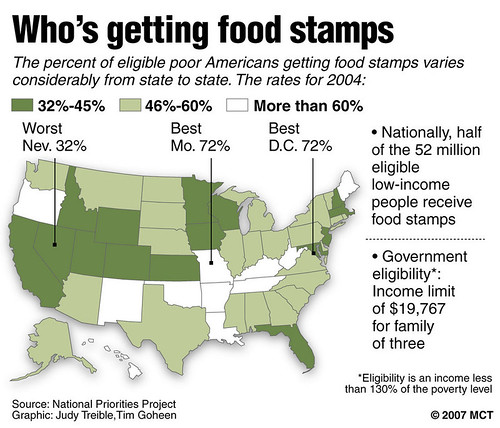
A map showing what percentage of eligible people are receiving food stamps, the Supplemental Nutritional Assistance Program (SNAP), throughout the United States. The House voted to cut 4 million from the program., a photo by Pan-African News Wire File Photos on Flickr.
October 31, 2013 at 8:17 pm
Food stamp cuts hit home in Michigan
Marisa Schultz
Detroit News Washington Bureau
Washington — Nearly 1.8 million Michigan residents will experience reductions in their food stamp benefits starting Friday, and more could be coming.
The cuts are happening because a temporary boost to food stamps Congress passed during the recession also expires Friday. The divided Congress not only didn’t pass an extension to the 2009 stimulus aid, but is debating additional spending cuts to the nutrition program.
Michigan’s congressional delegation will play a key role in the food stamp funding negotiations because it has three members on the conference committee — U.S. Sen. Debbie Stabenow, D-Lansing, and U.S. Reps. Dave Camp, R-Midland, and Sander Levin, D-Royal Oak.
More than 47 million recipients nationwide will have less money to buy food because of the $5 billion annual reduction.
The average cut for a family of four would be about $36 per month.
In Michigan, the food aid is loaded on to recipients’ bridge cards at staggered dates during the month.
The average monthly allotment last month was $263 per case, according to state officials.
On Thursday, Michigan League for Public Policy officials warned the benefit reductions are a precursor to further cuts on the table in Washington that they argue would be too harsh for local community networks to substitute and would hit children especially hard. Program costs will naturally reduce as the economy improves, they said.
“This is the wealthiest country in the world, and we don’t take food away from those that don’t have adequate resources to obtain food,” said Michigan League board member Don Gilmer, state budget director under Gov. John Engler.
Members of the Republican-controlled U.S. House and Democratic-led Senate are hashing out differences to their versions of the farm bill, which sets future food stamp funding.
The Senate-passed bill reduces nutrition assistance $4 billion over a decade while the House-approved version cuts about $40 billion.
Democrats argue the House cuts are too steep and will reduce the nutritional lifeline to families in need, while Republicans want to see tighter controls on eligibility to curb the record numbers of food stamp spending and participation.
In kicking off the farm bill negotiations Wednesday, Stabenow urged her colleagues to protect future benefit levels for food stamps, known as the Supplemental Nutrition Assistance Program.
“For American families, SNAP provides a lifeline when they face family economic disasters,” said Stabenow, chairwoman of the Senate Agriculture Committee.
Republicans want incentives for work included in the food stamp program, tightening automatic eligibility provisions and more state control on food and nutrition programs.
“I know nutrition programs have been contentious issues throughout our discussions,” U.S. Rep. Austin Scott, R-Ga., said Wednesday in calling for states to administer food stamps. “Our focus should be on changing the culture of these programs to provide recipients with a lifeline when they need it most while creating a greater economic opportunity for these individuals to rise beyond the circumstances.”
At Gleaners Community Food Bank of Southeastern Michigan, president DeWayne Wells said he is concerned Friday’s rollbacks will put greater pressure on the emergency food network that supports local pantries and soup kitchens.
Metro Detroit is still recovering from the recession, Wells said, and families “are having to rely on the emergency food network for longer periods of time.”
mschultz@detroitnews.com
(202) 662-8736
From The Detroit News: http://www.detroitnews.com/article/20131031/METRO06/310310125#ixzz2jMiyz7ia
No comments:
Post a Comment